
by David Guterson
Hardcover- $19.55
Click on the ORANGE Amazon Button for Book Description & Pricing Info
Overall rating:
How would you rate this book?
Member ratings
The Final Case, David Guterson, author; George Newbern, narrator
Although the book was inspired by a real case that the author heard about, he assures the reader that the book is fiction. There are times, however, when the line between fact and fiction is blurred. The storyteller is so skillful at telling the story that the reader begins to believe that it is non-fiction that they are reading, and not fiction at all. The author is a writer, his father was a very respected lawyer who died at the age of 83, pretty much the age of the main character in this novel. They also lived and worked in Seattle, Washington. That, however, is as far as the comparison between real life and created life, goes.
When the book truly opens, an almost 84-year-old lawyer, Royal, is lamenting to his son, a writer, about having very few cases, and therefore, can hardly find any reason to justify keeping his Seattle legal office open. Suddenly, his phone rings. He is being asked to be the Public Defender for Betsy Harvey, a woman charged with the murder of her adopted Ethiopian child, Abigail. Her husband Devlin has also been charged, but he has his own lawyer.
The story is tragic. The child, whose given name was Abeba, lived with her uncle Solomon in Sebeta, Ethiopia, after the death of both of her parents. When he was unable to take care of her properly, he placed her in an orphanage. At the time, she was ten years old and an Orthodox Christian. She was compliant and agreeable. She loved reading and had dreams of a bright future. She did have Hepatitis B, but exhibited no outward symptoms. When she was put up for adoption, the Devlins, who lived in America, adopted her.
In Ethiopia, Abeba was well behaved and bright, although she had suffered so much loss, she dreamed of a better life. In America, her dreams faded. The Devlins had seven other children. They were an American family of Fundamentalist Christians who devised their own rigid religion with a strict set of rules to live by. The Harveys did not believe in sparing the rod or spoiling the child. They renamed Abeba, Abigail Harvey. Still, however, she remained the biological daughter of Temesgen Addisu, and she hoped to return to Ethiopia one day to reunite with her Uncle Solomon and his family.
In America, the harsh life she was exposed to with the Harvey’s was different than the harsh life in Sebeta, Ethiopia. There she may have been hungry and sometimes dirty, but she was not beaten. She was happy, and she was loved. In America, however, she was brutalized by the Harvey’s, and one wonders how such a family was able to adopt her. It would be the subject of an investigation after her death. In America, her behavior and her attitude changed. She was no longer agreeable or compliant because of the vicious, cold and unfeeling type of care giving she experienced. She grew defiant, the more she was abused. She was just a helpless child. Often, she was punished, shamed, ridiculed and beaten. She was locked into a closet without light. She was whipped by the other siblings, under orders of their mother. They were afraid to disobey her. Eventually, Abeba died alone, in the yard, having refused to return into the house, but who could blame her for not wanting to enter that house of horrors. Both Devlins were charged with her death. Royal, accepted the case from the Public Defender’s office, to defend Betsy Harvey. He did not defend her murder charge, but rather, his approach was to say there is no law against being evil. As the story is related, as it is told by the son, who becomes Royal’s chauffeur and helper when he is in a fender bender and can no longer drive himself to the courthouse or to do any of the investigating necessary to defend Mrs. Harvey, it seems more and more real. As the relationship between the father and son is explored and the case is brought to trial, the reader witnesses both evil and virtue, guilt and innocence playing out. The Harvey's are evil, Royal is virtuous, Abeba is innocent. Society is guilty. Do evil people deserve a lawyer or a trial? How does one mount a defense for someone who is absolutely guilty of the crime, a crime so heinous that few lawyers would want to take the case? Still, someone has to, since everyone is entitled to a fair trial. What is the just punishment for people who never feel remorse but who, instead, feel righteous indignation? Is the real message of the book an examination of our lives and our deaths, of our extreme views and lack of flexibility, of how we feel toward others, how we treat them and how we love them? In the end, the writer and his wife agree, as they talk about their grief for the loss of their loved ones, that after everything, the most important thing to have in your life, is actually love.
Book Club HQ to over 90,000+ book clubs and ready to welcome yours.
Get free weekly updates on top club picks, book giveaways, author events and more








